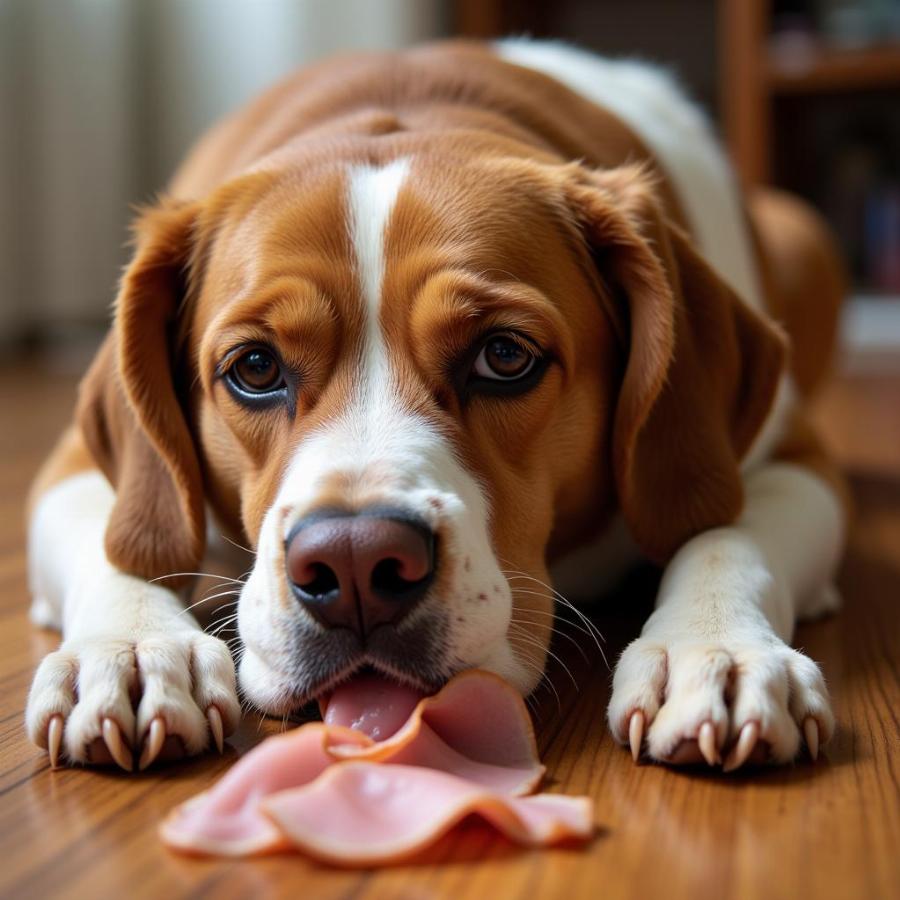As a loving dog owner, few things are scarier than realizing your dog has eaten something they shouldn’t have. Discovering your dog ate ham can be particularly concerning, as ham can pose some risks to their health. This article will guide you through what to do if your dog ate ham, potential dangers, and how to prevent future incidents.
Is Ham Bad for Dogs?
While a small nibble of ham might not send your furry friend straight to the vet, it’s important to remember that ham is not an ideal food for dogs.
- High in Fat and Salt: Ham is very high in both fat and sodium, which can cause digestive upset like vomiting, diarrhea, and pancreatitis (inflammation of the pancreas). In severe cases, pancreatitis can be life-threatening.
- Sodium Toxicity: Excessive salt intake can lead to sodium ion poisoning in dogs, causing symptoms like increased thirst, urination, vomiting, diarrhea, lethargy, and even seizures.
- Spices and Seasonings: Ham is often cured or seasoned with ingredients like garlic and onion powder, both of which are toxic to dogs.
- Uncooked Pork Risks: Feeding your dog uncooked ham increases their risk of contracting trichinosis, a parasitic infection that can cause severe muscle pain and other complications.
My Dog Ate Ham: What Are the Symptoms?
If your dog ate ham, watch for these common symptoms:
- Gastrointestinal Upset: Vomiting, diarrhea, loss of appetite, gas, abdominal pain, and decreased activity.
- Sodium Toxicity: Excessive thirst and urination, lethargy, incoordination, tremors, seizures.
 Dog Vomiting After Eating Ham
Dog Vomiting After Eating Ham
What Should I Do If My Dog Ate Ham?
Here’s what to do if your dog ate ham:
- Assess the Situation: How much ham did your dog eat? Was it a small bite or a whole ham steak?
- Monitor for Symptoms: Watch your dog closely for any signs of illness, such as those mentioned above.
- Contact Your Veterinarian: It’s always best to err on the side of caution and contact your veterinarian. They can advise you based on your dog’s size, the amount of ham consumed, and any pre-existing health conditions.
- Follow Your Veterinarian’s Instructions: Your vet might recommend inducing vomiting, providing supportive care at home, or bringing your dog in for an examination.
How Can I Prevent My Dog From Eating Ham in the Future?
- Secure Your Food: Store all human food, including ham, in airtight containers and out of your dog’s reach. Don’t leave food unattended on counters or tables.
- Train Your Dog: Teach your dog basic commands like “leave it” and “drop it” to prevent them from snatching forbidden foods.
- Provide Alternatives: Offer your dog safe and healthy chews and treats to keep them satisfied and occupied.
When to Seek Emergency Veterinary Care
If your dog exhibits any of the following symptoms after eating ham, seek immediate veterinary attention:
- Severe vomiting or diarrhea
- Lethargy or weakness
- Tremors or seizures
- Difficulty breathing
- Collapse
“It’s crucial to be proactive when it comes to your dog’s health,” says Dr. Emily Parker, a veterinary nutritionist. “If you suspect your dog has eaten something potentially harmful, like ham, contacting your veterinarian is always the best course of action.”
Conclusion
While a small taste of ham might not harm your dog, it’s best to avoid feeding it to them altogether. Ham is high in fat, salt, and potentially harmful seasonings that can lead to digestive upset and other health issues in dogs. By being aware of the risks, monitoring your dog closely, and taking preventative measures, you can help keep your furry friend safe and healthy.
FAQs
1. Can I give my dog a little bit of ham as a treat?
It’s best to avoid giving your dog ham altogether. Even small amounts can cause digestive upset.
2. What are some safe alternatives to ham for my dog?
There are many safe and healthy treats specifically designed for dogs available at pet stores. You can also offer small pieces of cooked lean meat, like chicken or turkey, as a special treat.
3. What should I do if my dog ate a whole ham bone?
Ham bones, like any cooked bones, can splinter and cause serious internal damage. Contact your veterinarian immediately if your dog has ingested a ham bone.
4. Can dogs eat ham fat or ham skin?
No, ham fat and skin are particularly high in fat and can contribute to pancreatitis in dogs.
5. My dog seems fine after eating ham. Should I still be concerned?
Some dogs may not show immediate symptoms after eating ham. However, it’s always best to consult with your veterinarian for advice, as delayed reactions can occur.
Have Other Questions?
For more information on dog nutrition and safety, explore our other articles on hammock dog car and dog car seat hammock.
Beaut Dogs
Beaut Dogs is your one-stop resource for all things dog-related, providing reliable and in-depth information on the fascinating world of canines. From breed-specific care guides to expert advice on nutrition, training, and health, we’re here to help you navigate the joys and responsibilities of dog ownership. Visit Beaut Dogs today at https://beautdogs.com to learn more and ensure your furry companion lives a happy, healthy life. When needing support, contact Email: [email protected] to receive detailed and accurate answers from Beaut Dogs.